Today, Garmin introduced their latest generation front bike light – the UT800. This light builds upon the connected concepts from their first generation lights, such as integration with their head units. With the UT800 though, the company has shifted the focus to the trail side of the cycling realm (though, it’s still perfectly fine for commuting). The unit now increases and decreases brightness with speed, as well as has other modes to save battery. Not to mention the nifty new mounting system.
I’ve been able to test out the UT800 both on trail and road rides, and thus have a pretty good handle on how it all works. Aside from the Varia Radar light I reviewed two years back, this is actually the first pure light focused in-depth review I’ve done (though I did do a first look of the See.Sense ICON lights). I have talked in a few posts about the Bontrager RT lights in the past, though never quite finished my review. The general concept there is similar though, and I like those lights quite a bit too.
In fact, it’s a point Garmin made pains to emphasize: While they technically compete with Bontrager in this space of ANT+ enabled bike lights, they don’t want to make it some sort of ugly marketing battle. They just want people to use lights on bikes, regardless of who it is. And it’s something that Bontrager has also echoed to me in the past as well.
In any event, this unit was loaned to me to try out and soon I’ll ship it back just like normal. If you find this review valuable, you can check out the links at the bottom to pick up your own illuminating goodness and help support the site via Amazon or Clever Training. With that – let’s dive into it!
(Oh, and like some other product reviews I do where the product is relatively straightforward, I’ve slimmed down the format here to pack as much detail as humanly possible into a more compact version. Hope you like it!)
Video Overview:
Oh, wait. Before we unbox this baby, if you’re the type that just likes videos – then the below is where it’s at. It’s about as close to a complete video review as you’ll get from me. But most importantly it includes legit and real light tests while outdoors trail and road riding to show how it all works.

Ok, with that out of the way, let’s talk boxes. Or rather, getting box naked.
Unboxing:
First up we’ve got the box itself. It more or less looks like most other Garmin boxes these days. And it packs quite a bit inside that small package. Do note on the back that compliance warning for StVZO, which governs light usage in Germany.
Also of note is the side of the box, which has a handy little chart showing lumens and how the light responds over time.
After opening it up, we’ve got a pile of plastic bags full of little parts:
Removing those bags you’ll find the core pieces sitting ready:
First up is the paper manuals, where the quick-start guide is actually kinda useful. It lists all the different modes and more nifty charts for figuring out speed and light intensity:
Next, we’ve got the light itself, but don’t worry, you’ll get plenty more looks at that by the time this post is over. It comes in at 130g in weight.
Moving along, there’s the micro-USB charging cable. It’s just like every other micro-USB charging cable out there. It plugs into the back of the unit:
Then there’s the mount. This is not like every other mount out there. Sure it’s got the standard Garmin quarter-turn mount up top for your Garmin Edge device, but down below it’s got what is basically an inverted quarter-turn mount.
More interesting though is the small adapter piece that’s included. This allows you to attach the light to it, and then easily lock it on/off the bike in a single twist. One side being GoPro compatible, the other being Garmin quarter-turn mount compatible.
Here’s how the whole pancake stack looks:
Oh, and in case you missed it up above, they also included two small hex wrenches to adjust both the GoPro-style mount as well as the mount onto your handlebars.
Finally, just to put size into perspective – here’s the older HL500 side by side with the newer (and brighter) UT800:
With that all set – onwards into the basics we go.
The Mounting System:
We’ll start first with the mount side of things, and then move into the technical components. Then I’ll compare light visibility in the next section.
First up we’ve got the Garmin out-front mount that I mentioned earlier. This is the same core Garmin out-front mount that came with the HL500 light a few years ago. However, it’s different than the standard Garmin out-front mount packaged within an Edge series bike computer box. This one has a quarter-turn mount on both upper and lower halves:
Up top is where you stick your Garmin Edge (or other bike computers that fit into that slot). Where things differ from the HL500 is that this now has the secondary adapter. This adapter has a GoPro/VIRB mount on the bottom, and a Garmin quarter-turn mount up top:
In fact, you can even use this to mount a Garmin or GoPro action camera as well, making them handy to perhaps buy a couple of them so you can quickly pop on and off action cameras or lights without any tools.
Speaking of the sans-tool part, the main goal of this design is that you can just twist the locking ring in a single motion (even with gloves) and it locks on tightly. And yes, it does do exactly that. Once locked it doesn’t budge.
Yet you can still adjust the up/down angle of the light using a hex wrench as you see fit.
All of this works pretty well and is probably one of my more favorite parts of the whole kit. I just wish Garmin would then offer an aluminum version of the same double-sided mount, and I’d be totally happy.
Illuminating Details:
Next, let’s talk the light itself. On the left side is a single button. This powers it on and off, and also changes modes. You can further hold it down to power it off entirely.
Once you power it on it’ll go into a pairing mode, which enables it to be added to a ‘light network’ from your Garmin Edge device. Technically this is open standard ANT+ (Lighting Profile), so any company (like Wahoo or Lezyne) could implement this in their head units. You can thus also add in multiple lights, even from different vendors. For example, you could use Bontrager’s rear tail lights, and combine them with Garmin’s front light. Whatever floats your boat.
Within the lighting options on your Edge you’ll see each individual light and the battery status of that light. You can also pull this up from the status menu by swiping down on the Edge 820/1000, or pressing into the status button on the Edge 520.
You can then configure options for the network. For example, you can set it to not turn on your lights until you actually press start on your Edge device. As soon as you do that, it’ll turn on the lights automatically. Thus saving battery while you’re standing around getting ready.
You can also configure whether or not the Edge will automatically control brightness on the lights, or if you want that to be manually controlled. You can always override this at any time either from the Edge itself (and a new lighting control panel data page to be released soon) or just by tapping the button on the light.
Which gets us to the variability aspect. The light has a number of modes within it, each with different battery levels:
800 lumens: 1.5 hours
400 lumens: 3 hours
200 lumens: 6 hours
100-300 lumens pulsing (night mode): 6 hours
700 lumens flashing (daylight mode): 25 hours
Each of these modes can be manually iterated through by simply pressing the button on the side. Also, the manual says it’ll hold a charge for an entire year if not in use, which his pretty darn impressive. Obviously, I can’t validate that at this point.
Next, and more importantly is that the light, when used in conjunction with a Garmin Edge device, will automatically change intensities based on speed. It does this in the three settings noted above (200/400/800 lumens). This is done to save battery and to give a non-overkill amount of light to your situation.
The idea here being that as you climb on a trail you’ll need less light because you’re moving slower. Whereas when you’re riding downhill at full speed, you’ll need more light to ensure you aren’t outrunning your lights. All of which in my testing actually worked out great while out on the trail.
Speaking of which, I’ve gotta give props to a crew of guys that helped me out in filming and photographing out in the (very dark) woods last week. Being a moonless night, all of us were at times standing in the pitch black next to a camera waiting for whoever was riding to ride by with the UT800. We didn’t want any other ambient light or other bike lights messing up the shots.
We’ve got Jonathan Lee on the right (from TrainerRoad), and Ian Meintjes in the middle (also of TrainerRoad, and Pro Enduro Racer for KTM). All of us spent hours out on the trail in clothing definitely not suitable for the task trying to get the night shots. As for ‘my bike’ for those days, it was loaned by Steven Lewis of MTBPodcast.com. It’s an incredibly sweet and totally brand new bike. I was actually the first to put it through its paces between that and the previous day of riding.
Funny aside…much of the shooting was about a 20-minute ride away from where the trailhead started, but I didn’t bring a secondary bike mount for the older HL500 light. No worries, Jonathan managed to MacGyver a solution together using a Wahoo TICKR strap on a K-Edge Garmin out-front mount for his bike. Astoundingly it actually held the entire night.
Once again – thanks all!
Back to the tech side, some might be wondering how the light shifting/changing piece is different from before. With the previous HL500 (which has 500 lumens), that light had two different bulbs in it, which in turn hit two different reflector points. So instead of changing the light intensity, it changed where the beam was pointed (closer or further). But that didn’t save any battery, it just shifted things around. Whereas with the UT800, it’s saving some considerable battery by reducing the brightness.
As for on-road visibility, it was just as good as in the trails. With on-road on brightly lit streets you can get away with the pulsing light (which isn’t total on/off, but just slowly increasing/decreasing lumens). Whereas when things get darker, you can go with the full 200/400/800 lumens.
One oddity I did stumble into just two nights ago in Los Angeles was that some well-lit intersections would ‘trick’ the Edge 820’s ambient light sensor. As such, it thought I was in daylight and would toggle over to the daylight flasher mode. I brought this up to Garmin and they’re looking at a possible fix in an upcoming firmware update. Though I could always just override it via either the Edge or unit itself. I never had this trigger in any darker road or trail situations, but only in a handful of very bright intersections. It didn’t really impact my visibility for the simple reason that it was already pretty darn bright. Either way, something I’ll look for in the future.
Comparing Light Visibility:
When it comes to comparing the different lights, the most important aspect to consider isn’t the light at all – but rather, the camera. In the same way that I stress that configuration of microphones is the most important aspect in trainer noise tests, the same is true for light tests: It’s all about the camera settings.
I can make any light look like any lumen value I wish. I can make two totally different lights look identical. I can make one brilliant light look horrible, and another horrible light look great. The quality of the lens/camera being a major factor, as with the exact settings I use.
The purpose of this isn’t to make you think I’m showing you #FakeLights, but rather to be aware that on any comparison site (including here) that the limitations of photos and video come down to the settings used. In my case, all of my on-road and on-trail comparisons were done with a GoPro Hero5 Black in 4K/30 mounted on a GoPro Karma Grip Gimbal attached to my chest using the GoPro Seeker backpack. This gives me a bit better light performance, but it’s nothing compared to my DSLR.
To demonstrate this, look at the below imagery. These were taken at the same time with one camera atop the other. One from the $399 GoPro, and the other from the $3,000+ DSLR setup:
With that in mind, let’s look at some comparisons out on the road. Here are the three light levels while riding in complete darkness:
Next, let’s look at the comparison between the older HL500 (500 lumens) and the new UT800 (800 lumens). Remember that the HL500 is designed to have a very narrow beam (primarily for road use), whereas the UT800 is designed as a wider beam. That’s easily seen below comparing these two lights against a wall:
(These last two photos were shot with a DSLR on a tripod, which goes to show you just how different cameras evaluate light compared to the moving shots on the bike with the GoPro.)
What I found was that the brightness of the UT800 was more than sufficient for trail riding, even downhill at speed. And equally, it was just fine at the lower lumens for going uphill on trails.
While out road riding on brightly lit streets I didn’t find the light made all that much of a difference, and I could have primarily used the slow-pulsing mode to save battery. However, once I went into darker areas, it was nice being able to pump up the brightness and light up my surroundings.
Summary:
I’ll be honest – when I first heard of another bike light from Garmin, I wasn’t super excited. It was roughly akin to being told I was being given broccoli with a side of cauliflower. Yet, once I had my hands on it, I’ve gotta say I’m kinda impressed.
I’m not sure whether to be more impressed with how well the light works itself, or with the nifty mount doohickey. I’m a sucker for cool mounts. It’s like my comfort food of technology. And this one delivers with a truly useful mount innovation that’s actually super functional. If only they’d make a darn metal/aluminum mount with that same lower attachment point and we’d be in golden-happy land (for better action cam footage).
Of course – this is all about the light – and in that area they really do actually nail it. I totally see myself using this thing as my primary bike light, for the simple reason it doesn’t look like a brick. I rarely need to ride more than a couple hours at night at a time, and most of the time it’s in the city. Yet when I do go outside, it’s nice to have the power behind the light to illuminate the darkest of trails.
While I did see the one quirk noticed on the Edge giving a false-positive for daylight (thus triggering the light into daylight mode), I’m optimistic Garmin can fix that. Or failing that, I can just use it in manual mode.
Either way – if you’re looking for a great trail light that doubles for commuting, this is definitely one to consider. It starts shipping today, and is priced at $149USD, which is in the ballpark for other connected lights.
Found This Post Useful? Support The Site!
Hopefully you found this review/post useful. At the end of the day, I’m an athlete just like you looking for the most detail possible on a new purchase – so my review is written from the standpoint of how I used the device. The reviews generally take a lot of hours to put together, so it’s a fair bit of work (and labor of love). As you probably noticed by looking below, I also take time to answer all the questions posted in the comments – and there’s quite a bit of detail in there as well.
If you're shopping for the Garmin Varia UT800 or any other accessory items, please consider using the affiliate links below! As an Amazon Associate I earn from qualifying purchases. It doesn’t cost you anything extra, but your purchases help support this website a lot.
And of course – you can always sign-up to be a DCR Supporter! That gets you an ad-free DCR, access to the DCR Shed Talkin' video series packed with behind the scenes tidbits...and it also makes you awesome. And being awesome is what it’s all about!
Thanks for reading! And as always, feel free to post comments or questions in the comments section below, I’ll be happy to try and answer them as quickly as possible. And lastly, if you felt this review was useful – I always appreciate feedback in the comments below. Thanks!




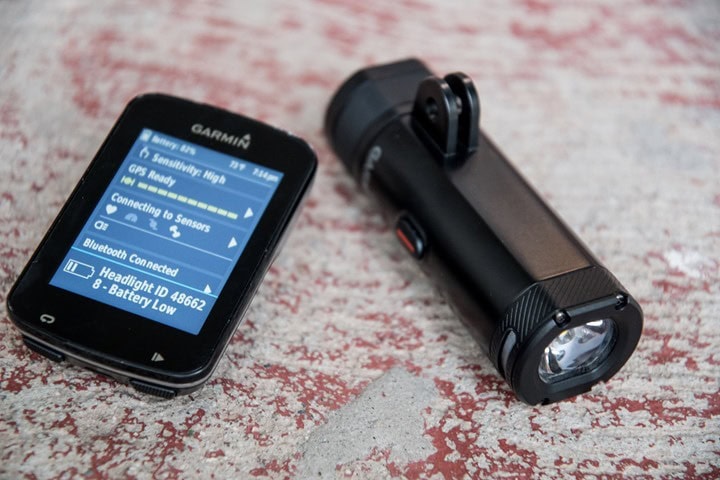
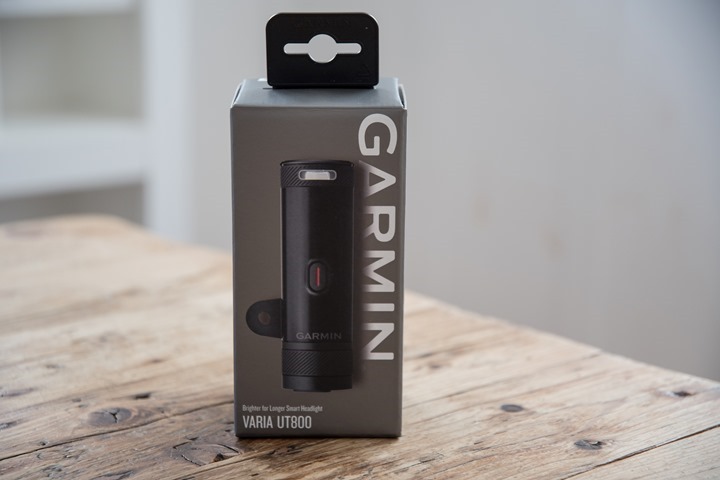
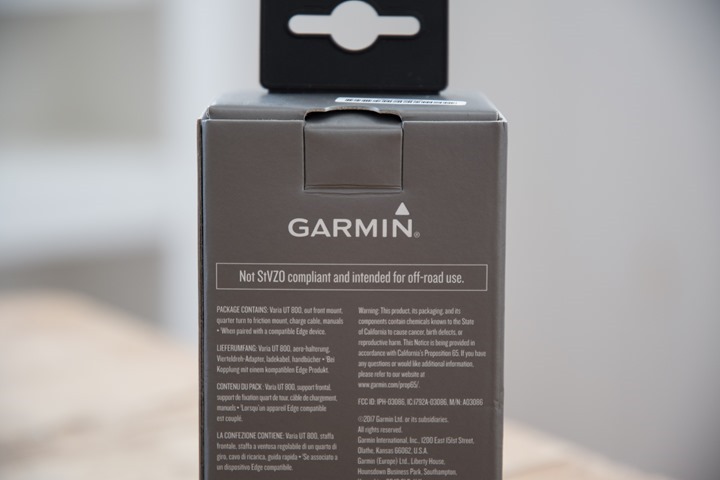
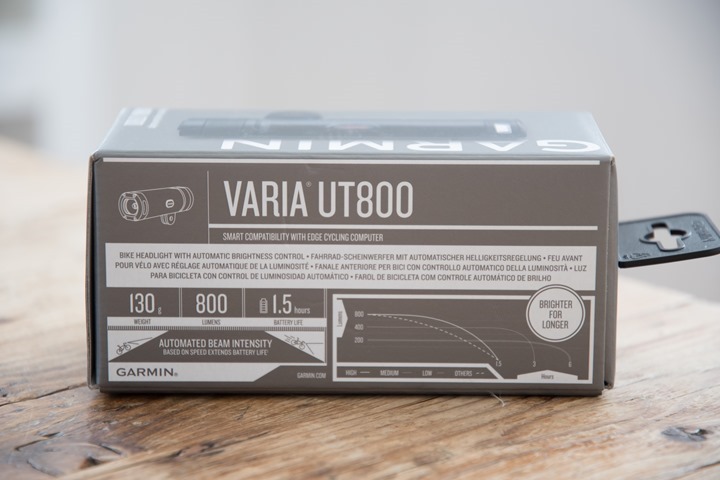
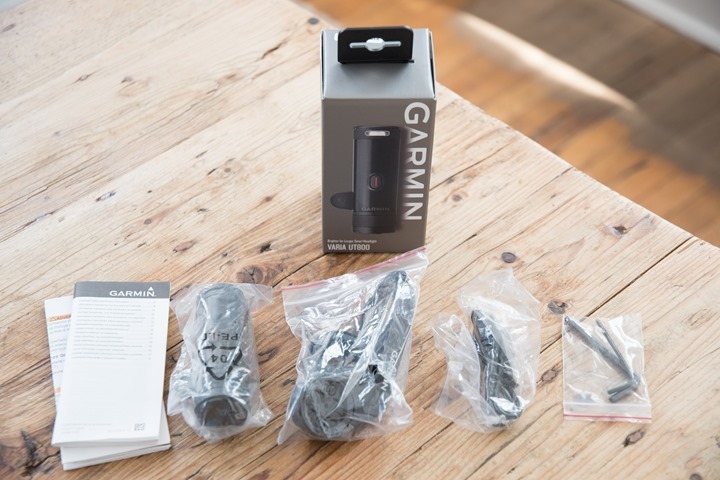
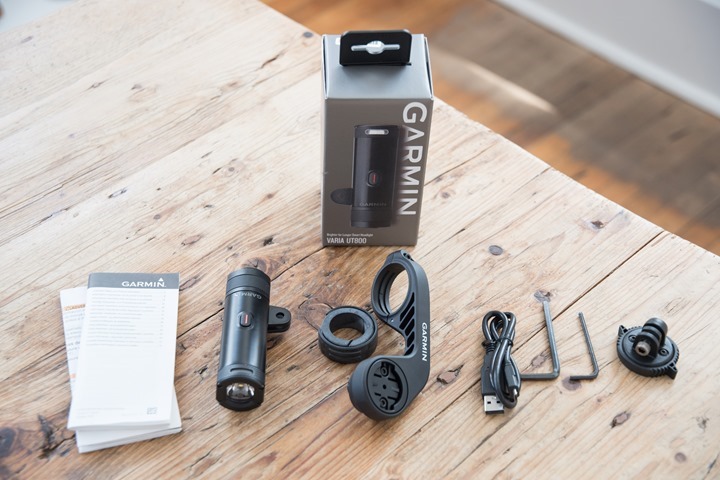
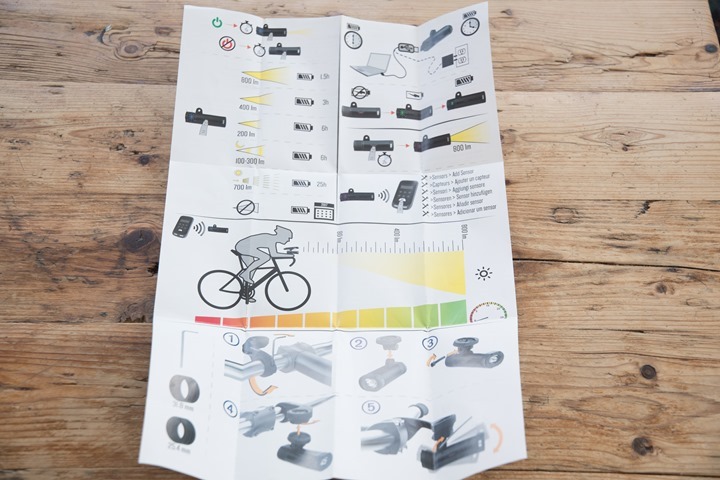
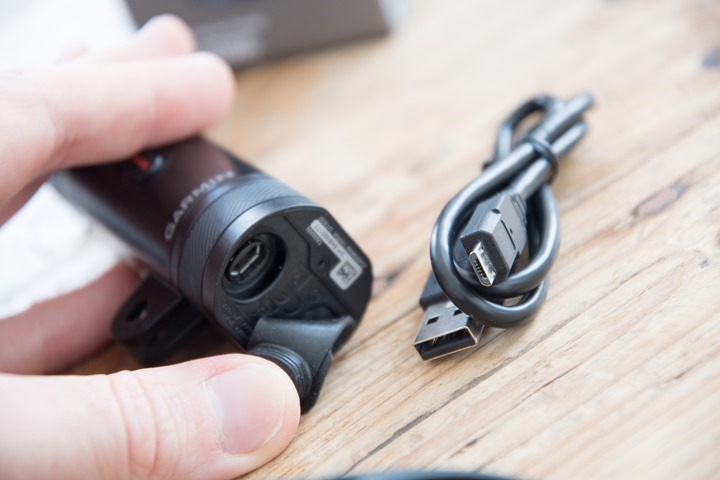
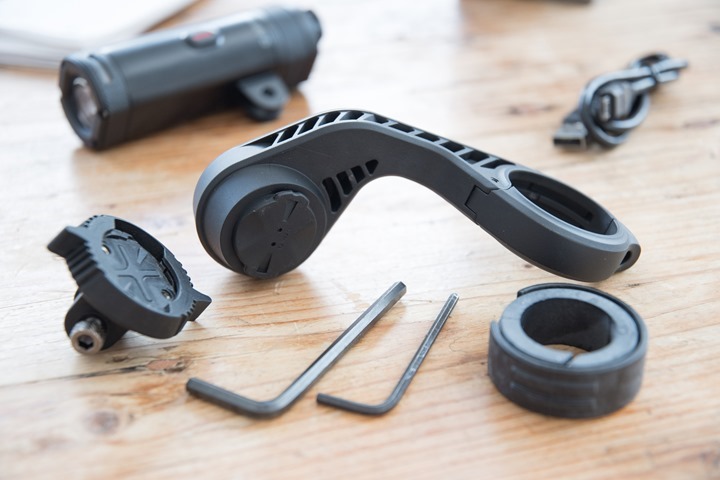
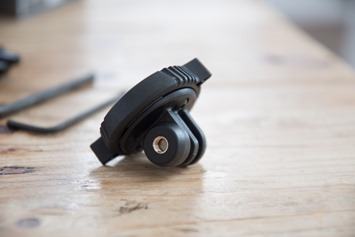
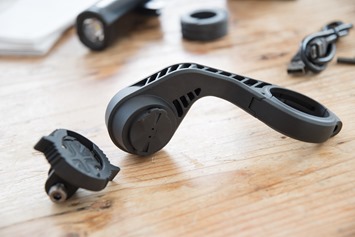
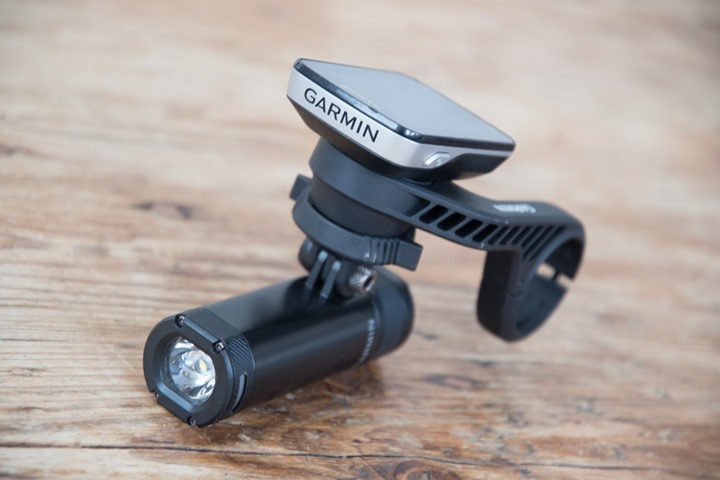
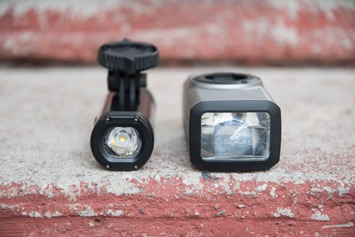
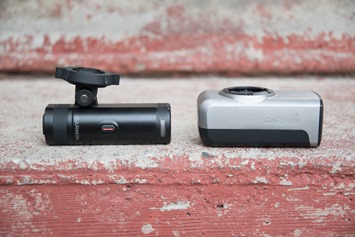
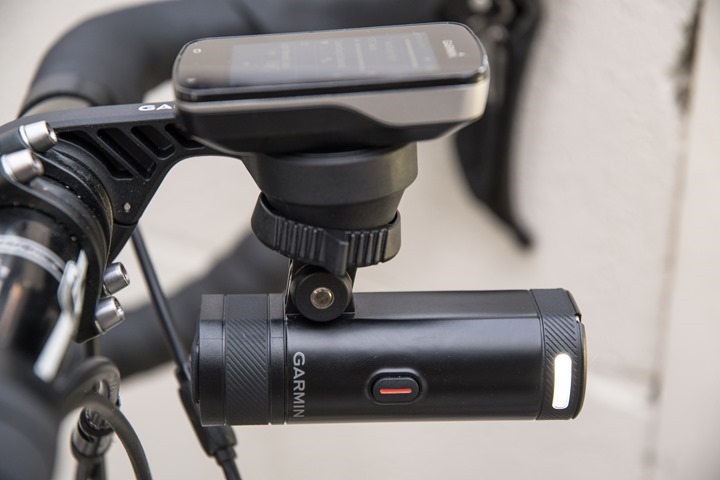
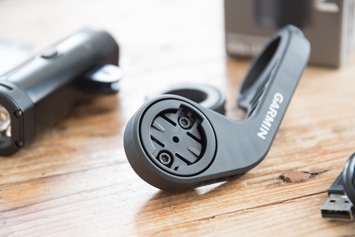
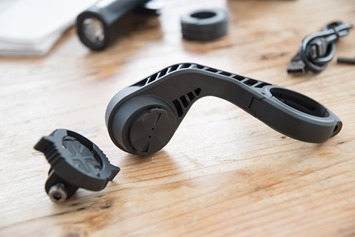
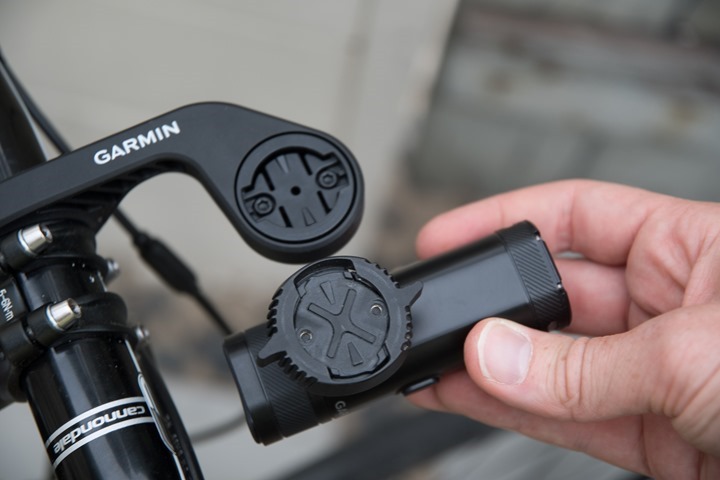
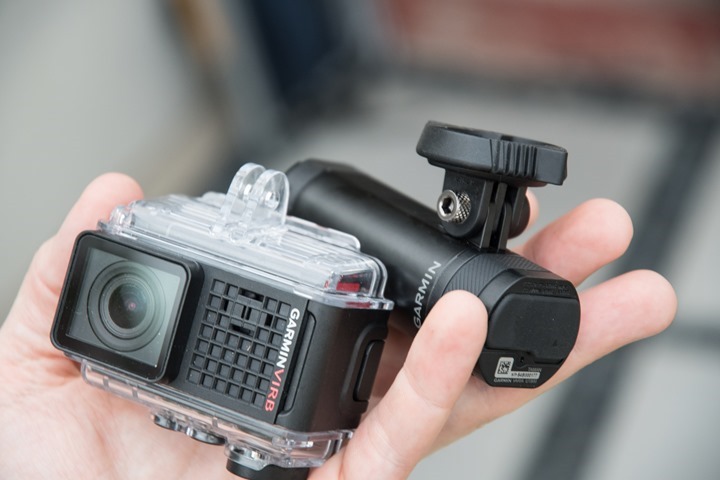
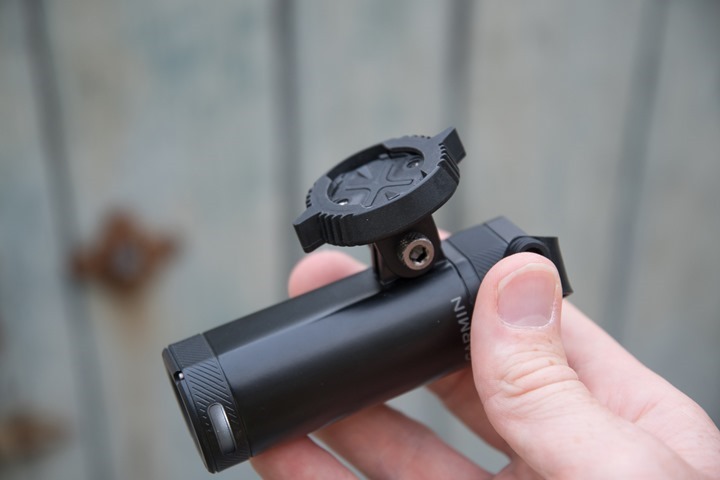
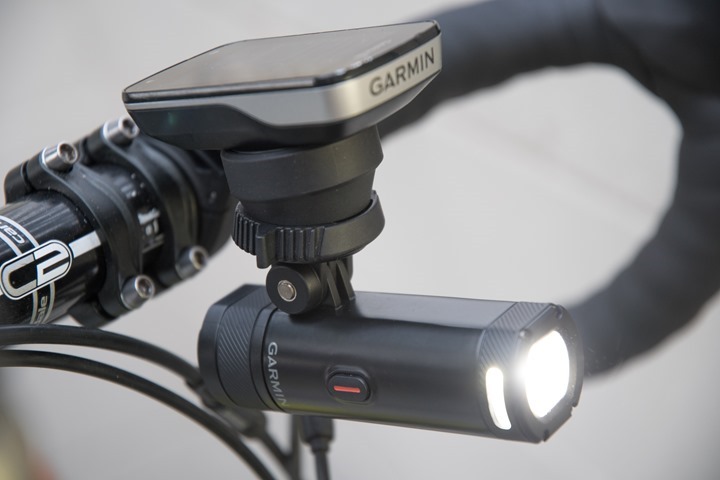
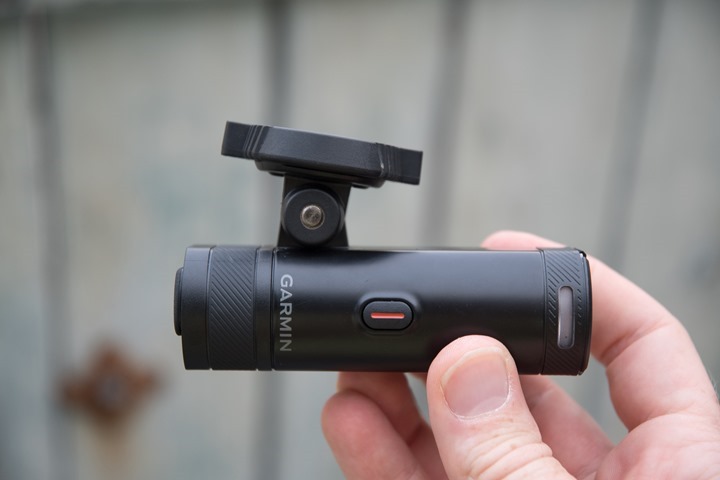
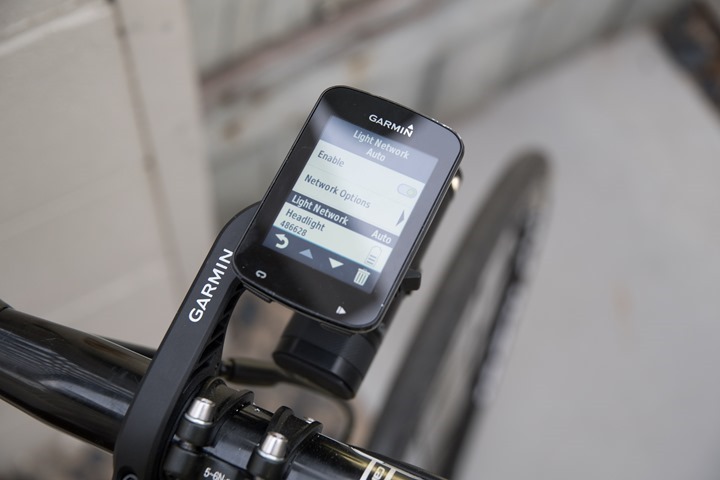
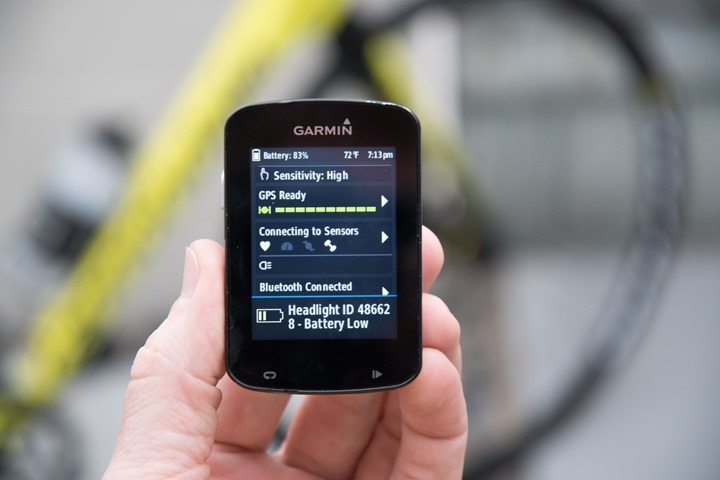
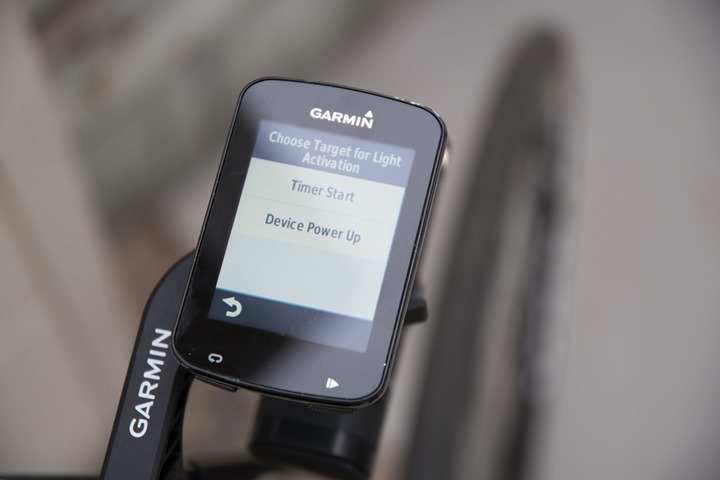
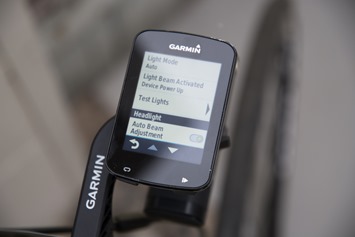
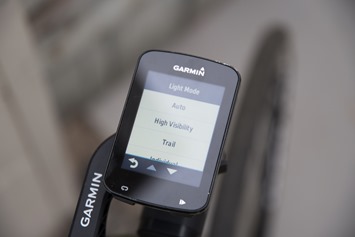
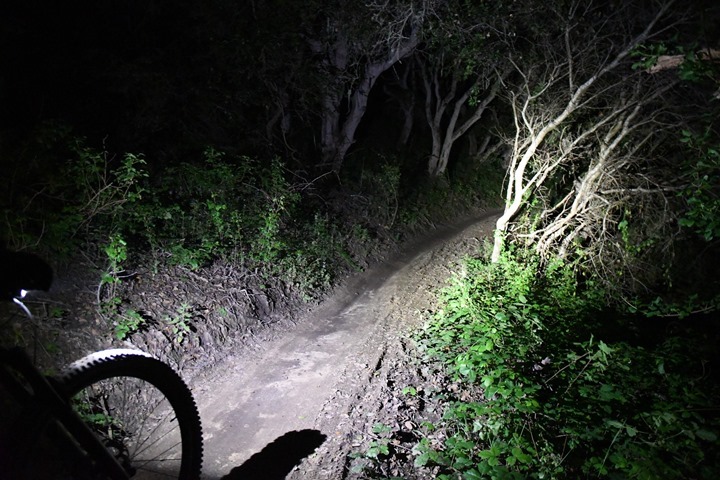
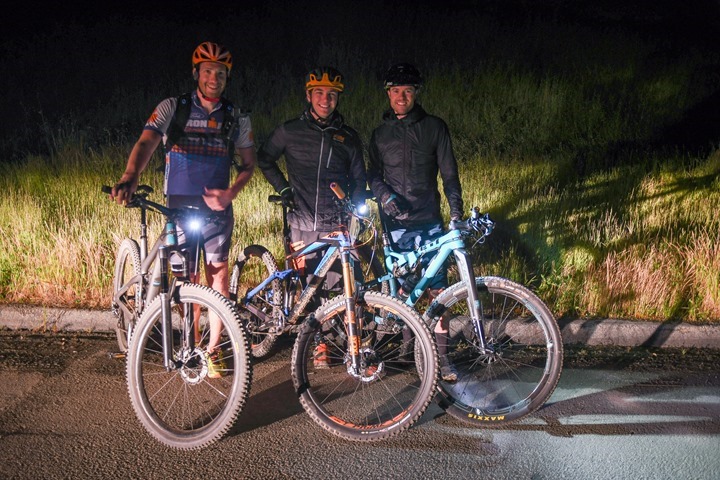
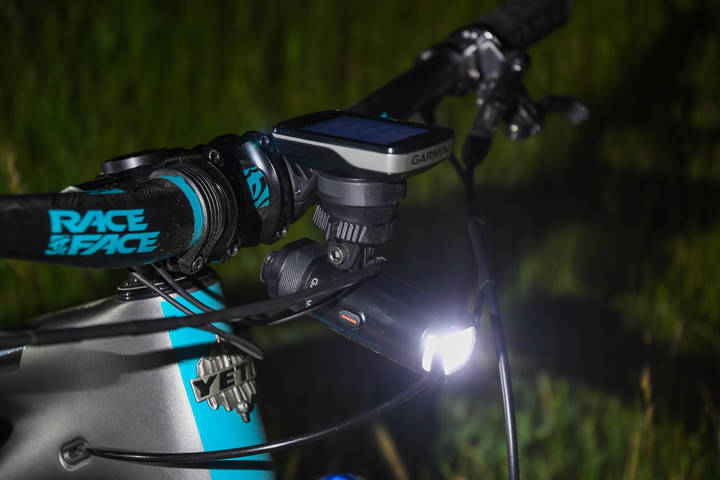
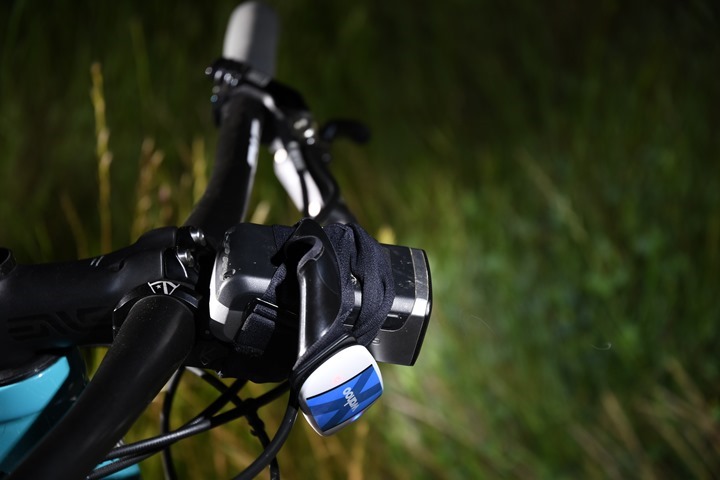
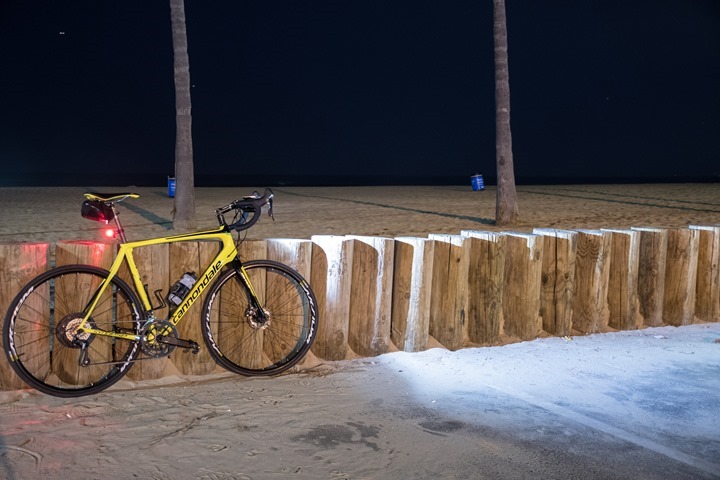
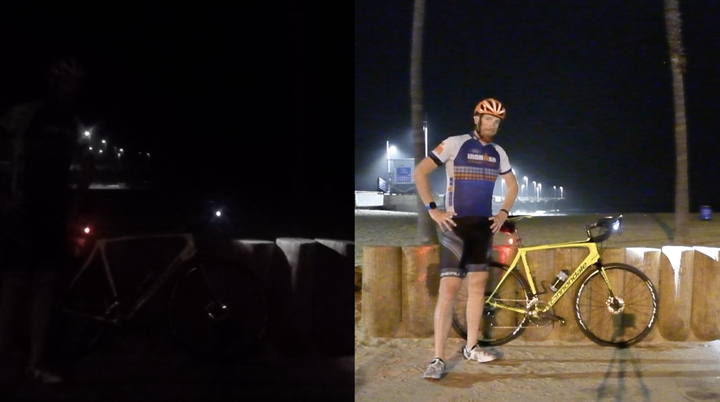
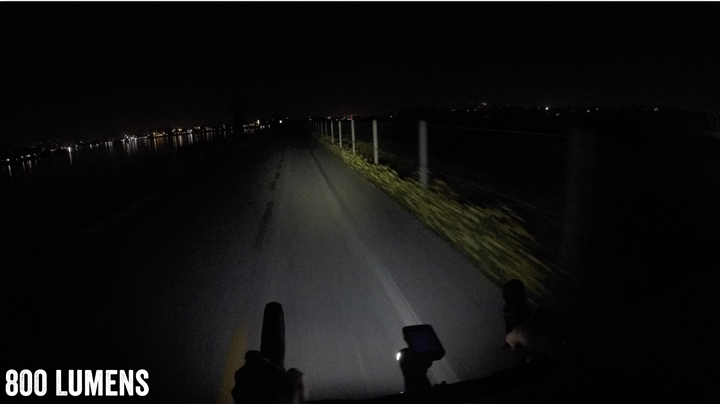
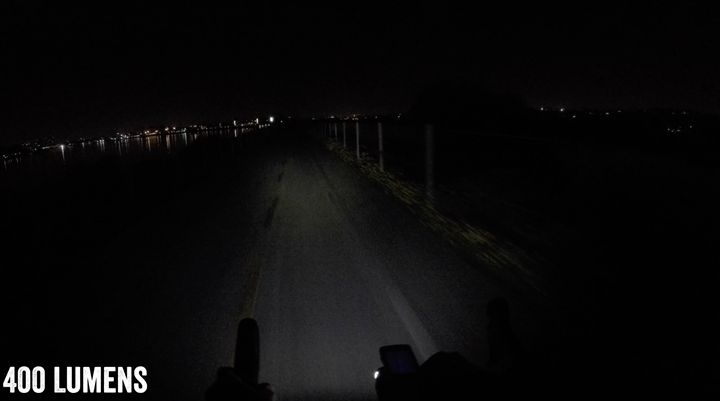
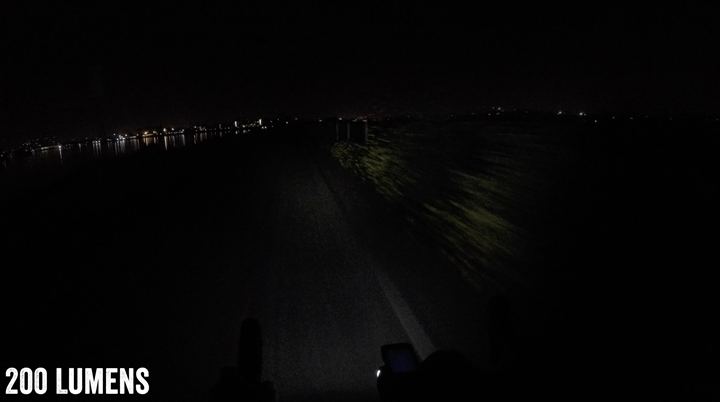
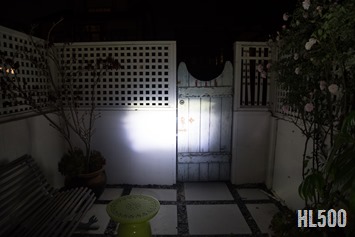
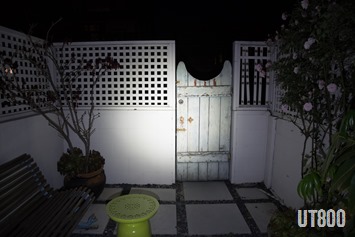
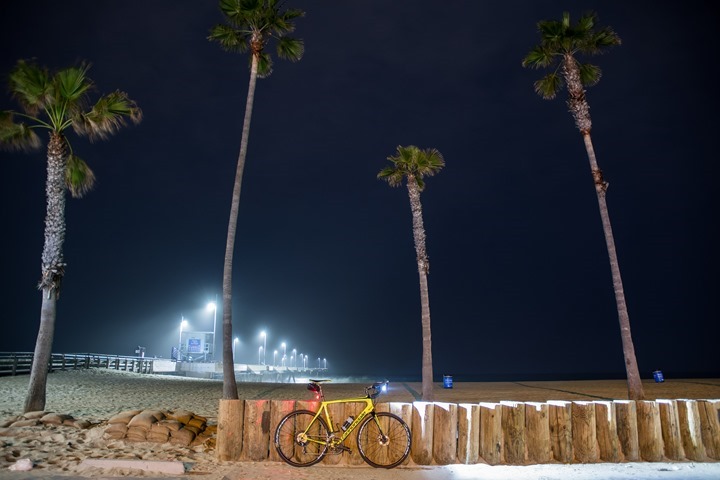
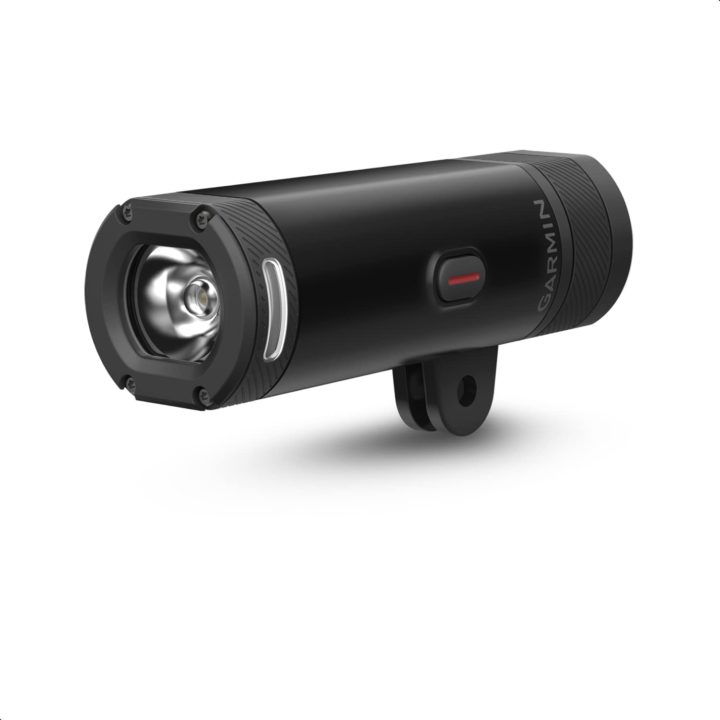
















Is there very little demand for a bike light that does not temporarily blind coming cyclists on paved bike trail (like the Burke Gilman trail in Seattle)? I think it would be nice to have a “bike trail” mode that when enabled, casts a more narrow beam pattern.
More people should get behind something like Germany’s standard for StVZO lights. (maybe not as restrictive)
The thing to keep in mind that is that the StVZO standard is great for what it’s great for: Road riding.
But it’s not really great for mountain biking. Two different use cases, in the same way that a mountain bike is different from a road bike.
Yes, but garmin does call this light the “Urban Edition” so beam pattern for an urban light matters. All I’m saying is it would be nice to have some sort of standard that helps improve beam pattern for paved use and makes it easier to spot a light that follows that standard. Not saying every light needs to do it
Is there any upside-down gopro mounting StVZO light?
Yes: link to lupine.de
With the GoPro Adapter: link to lupine.de
@Eli: Thanks for mentioning the StVZO standard for lights. I had never heard of it until you brought it up. I have just ordered a StVZO-compliant Ixon CORE headlight made by Busch and Müller. I am really looking forward to testing it!
I had bought the UT800 Trail Edition when it came out. However, the USB door cover never really sat properly, so I sent it back. That one had the StVZO warning on the box.
I thought I’d pick another one up when I could get a decent price on it, but it has seemed to be out of stock for a long time.
A retailer in the UK is doing a particularly aggressive price on it at the moment and handily Halfords do a price match, plus British Cycling discount, so I just paid £90 for one, much better than the £150 it should be.
Anyway, the new one has no mention of StVZO non-compliance on the box any more (though it is the Urban Edition I now have). Is this why it was out of stock for so long? Has the unit changed in any way? (just curious if anyone knows)
Interesting how the light is relatively small. For trail use you’d think a bigger battery would be necessary. The burn times are not confidence inspiring for a longer night ride.
Well, keep in mind that for burn times it’s unlikely you’d need full lumens the entire time. Anytime you slowed down it’d dip the lights down.
Interesting if it could exceed the 6 hour run time if the dimming tech worked that well
Oddly, the FR935 is not on the “compatible devices” list for the UT800.
It’s listed as an accessory for whatever reason…
It’s compatible, as is the Fenix 5.
Hi Ray. There is something wrong – I cannot see the video on your page (nor on YT). Also – both your page and CleverTraining is saying that price is 149,99$ – yet Garmin page is saying 139,99$.
Weird. The Garmin press release I have says $149 as well. :-/ I’ll poke someone.
Video fixed :-)
Price (on garmin.com) fixed :-(
Thanks for the review!
How would you consider the waterproofness of the light? Up here north with the salty roads in winter waterproofness is absolutely criticial..
On their site it specs IPX7
Correct.
Fwiw, it’s developed by a Garmin team based in Alberta (Canada), which has some pretty craptacular winters. :)
There’s a Garmin team in Alberta? Where? Feels like we’re becoming a burgeoning bike tech hub, with 4iiii and now this!
They’re based in Cochrane, along with Dynastream (which is ANT+, which Garmin owns). Over time Garmin has expanded that locale with Garmin-specific projects/teams (vs ANT+ specific projects). For example a lot of Vector stuff is also done there.
Hi,
Do you know if it’s possible to charge the light’s battery while still using it? This is kind of a deal breaker to me, because if I need longer battery life for a 24h race or something like that I could just use a usb battery pack on the camelback and a long usb cable.
Thanks!
Walter
You need a 24-hour headlight?
Where are you racing? Northern Norway in winter?
No, no, I don’t really need 24 hours of light. :)
But on a 24 hour race I need about 10 hours of continuous light, and that’s more than the internal battery is able to provide.
There is a niche market for this. I just did a road night ride last weekend with a good 10 hours of darkness, and outside of a few lights that are designed for the 24 hour races (Niterider used to sell a 8-cell battery for their setup for example) there aren’t great relatively lightweight options.
My solution is to use two Dinotte AA-powered lights. 4 Lithium AAs will usually last through the night with judicious use, and I can carry one spare set with minimal weight penalty in case of emergency.
But the AA powered Dinottes aren’t nearly enough light for night-time MTB rides. For that, I’d like to have the ability to strap a 12000 mah battery to the my toptube and run off that instead. I haven’t found many lights that allow that.
I tried plugging it into a 1AMP wall outlet, and it won’t power from that and turn on at the same time. I can’t seem to find any 2AMP outlets nearby me at the moment to see if it’ll work there.
Have you considered a headlamp?
Petzl makes several headlamps that have 10+ hours of light, and even auto-adjusting brightness for whether you’re looking far ahead or at near terrain.
I wear one on my bike helmet for commuting, and on my head when trail running at night.
The Petzl headlamps are nowhere near bright enough for MTB racing.
24 hour races are usually lapped events. Rather than carry one super-large battery for the 10 night laps, people usually just get some extra batteries, whether buying additional ones, or borrowing ones from friends that use the same light system, then just switch them out as you come through the pits. Quite a bit of weight savings, and you’re not reliant on just one battery. A lot of 24 hour races even provide charging stations so you could use 3 2-hour batteries, and have someone go throw one on the charger each time you come through.
Also, when mountain biking you generally want one light for your handlebars, and one for your helmet, so you can see where you’re going when your turning. Whenever you’re entering a turn the handlebar light will be facing straight still, not into the turn. It’s also for safety. If one light craps out while you’re bombing downhill, you won’t be plunged into total darkness.
Generally, you want the brighter one on your helmet, as that’s the one you’re looking further down the trail with, looking through corners, etc. The handlebar light just provides some general light in the more immediate vicinity of your bike.
I hate lights with built in batteries on my helmet, the weight is annoying. Both headache aspect and because the weight makes the helmet move around more
Fwiw – they do have a helmet mount for this light.
Petzl makes a headlamp that is nearly identical output to this Garmin (750 lumen max, 300 lumen sustained), and appears to have a wider and longer throw of light.
I use their 300 lumen one for night trail running and bike commuting, and it’s way more light than I need.
@Phr: I love my Dinotte lights. I’ll gladly strap a battery on the top tube or stuff a battery in my hydration pack and have hours of riding time with much more light than the Garmin will give me. My primary use would obviously be for mtn biking at night and 24 hr races for riding at night:-) Dinotte make some incredible lights. I really wish they’d make a 6 cell battery. I’m also with Ray on this mount. Super cool and hopefully an aluminum version will show it’s head soon.
I’m not sure if I’d call it a niche market in this day and age. But ok, it’s not mainstream. Being able to charge or externally power your lights while riding is important to any long distance rider and this has been my biggest complaint with the current Garmin lights. The smart features and ability to control them from your head unit and via the Di2 Dura Ace Remote switchers are simply great. But you should at least be able to plug in an auxilary power source while riding. The lights shut down the minute you plug them in.
Exposure make great lights that not only allow you to run while charging, but also have the ability to transfer power from one light to another over an umbilical cord. But then there’s the lack of smart features and the ability to mount them on the out front mount.
This light is still a big step up from the old one, which was heavy and bulky.
I guess we can never get it all in one package :-(
Hi, I didn’t see any reply to the original question. Is it possible to charge the UT800 while using it?
Thanks,
Patrick
The UT800 is unusable whilst charging. Over the years, others in the thread have documented this. Cheers
Well the Varia radar unit is really great. A really valuable piece of equipment have on the back of your bike.
However, as a front lights were spoilt for choice and I can’t imagine anybody really spending a lot of time configuring and controlling their front light simply because they can.
The Cycliq fly 12 front light including a camera is fantastic – except for the (sorry) completely incompetent implementation of the Bluetooth function. But if you don’t bother to use that, it’s a great light/camera. Long battery life, rugged, good quality film. Everything you need.
I think if Garmin had wanted to make a real splash, then they might have integrated a light and camera and that would have been a very interesting and in my view natural development.
Another thing about Cycliq is that their customer service is superb. Garmin seem to treat themselves as gods. You can pray to them as often as you like, but you never get an answer.
Agreed.
Garmin needs both dumb head/tail lights and a version with integrated cameras.
How about instead of the Varia radar, it had a motion sensing camera that displayed the image on your head unit, their Vision heads up display, or buzzed your watch/head unit to tell you to check your helmet mirror?
What mateial is this, pls? Plastic fantastic or titan?
The main body is black anodized aluminum.
I may be missing something but I still don’t see the usefullness of this but I guess I never did MTB trail but for my commute having a dumb light works for me, no need to be connected to my garmin, it’s just a switch on switch off. Thanks for the review tho!
I agree. Simple is often good enough. I have a decent flasher for day time that lasts for weeks on a charge and a decent, bright light for nights that has to be charged after use. No syncing required.
Absolutely agree!!! Cannot say any advantage!!
The advantage is that the light lasts longer, being only brighter when you need it to be when you’re going faster, and it dims to save battery when you’re going slower. You could do the same by trying to remember to turn up the brightness before any downhills, and then remembering to dim it on the climbs, but it’s easy to forget, and it can be hard to reach the light to change it manually if you’re already going fast on a downhill and you can barely see because you left your light on dim.
As always, thanks for the great review.
Unable to watch the video as “This video is private.”
Sorry, the YouTube scheduler failed me. :( No explanation otherwise. Switched the video over to Public. Enjoy!
Nice review.
I would hope that Garmin come out with a Fly-6 competitor. Fly6 has an ongoing on / off switch issue – it just wears out and stops working but despite hardware revisions, Cycliq have never fixed the issue. I’ve had replacements on a 12 month basis. Anyway, I don’t want to sound like a fly6 rant, because it is a good device otherwise.
Having such a backlight with Ant+ support would be great, and the video uploaded to the phone. Garmin already have the technology to do this. Such a device would be a nice revision to the next Varia device.
Well I’ve never had any problems with my Fly6 switches – and I’ve had three of them.
I had problems with the amount on the original version – but I reinforce the mounts and it was fine.
I bought the new version and it all works extremely well. Fantastic light, fantastic rear camera
Can this be run and recharged via a dynamo hub?
It would depend on the exact power output. In our discussions they noted that smaller USB battery packs couldn’t power it constantly (draw is too much). I’ll dig up the exact draw figures.
Does the new light switch off and go into charge mode when you plug it into a power source like the old lights?
Is there a standard for connected lights? I only ask because the head unit space has a lot of fantastic competition, and a lot of people are moving away to newer Wahoo, Bryton, and Lezyne units. I know you hate proprietary as much as everyone else.
Yup, the ANT+ Lighting Device profile. Any of those companies can use it. Wahoo actually initially talked about potentially doing so, but nothing has materialized there. Was actually released two years ago this month: link to thisisant.com
This is very similar to the Petzl headlamp that I use both for trail running and bike commuting.
The difference being that it also shifts light to terrain and head position, so that you don’t blind oncoming runners/cars.
It also has a red light mode to preserve night vision, which granted, isn’t as valuable on a bike.
I still think my Petzl is a superior choice to this, especially being multi-functional for biking, running, camping, and having multiple battery options.
link to petzl.com
300 lumens just isn’t anywhere near enough for a mountain bike headlamp. Double that to 600 lumens and it would be sufficient for a normal mountain bike pace. You would have to really slow down if using a 300 lumen light, and this light is targeted at mountain biking.
At full speed it’s 800 lumens, whereas at slower speeds (basically uphill), it’ll drop down to 200 lumens. It was more than sufficient for me in both dense brush/trees as well as wide open stuff while climbing (slow) at 200 lumens. And at 800 lumens, no issues there for descending.
Good to know. I have no experience night trail riding, just trail running.
The next step up from the Petzl light I linked is 750 lumen max (6.5 hours) or 320 sustained (15 hours). It’s reactive to terrain, just like this Garmin light, except without GPS info – it senses light reflecting back and self-adjusts.
“… so that you don’t blind oncoming runners/cars…”
I could not prevent myself from finding this funny – the main reason I use a light when running *is* to blind oncoming cars when coming to tricky intersections… It’s magical, they stop instead of just driving straight through stop signs. Most drivers who would have zero issue cutting you off if they knew you were just an idiot runner will stop if they cannot tell what that bright light in their eyes really is.
But my running headlamp (Black Diamond Sprint) is a measly 200 lumens, good to run (and blind drivers), but I couldn’t see myself moutain biking with that little power.
Great review. I sometimes read these posts even though I don’t always have interest in the product.
I use a zebralight h600 MK II with my bike. So I’m good for light for a very long time.
Am I the only person who hates the round beam pattern? Well guess I do more road biking where I like a cutoff at the top and more spread out. I do love the Seca’s beam link to lightandmotion.com
But no Ant+ :(
It looks like a cool mount and a nice way to keep your stem and bars clean. How does the full setup (lights and an Edge on an out front mount) affect aerodynamics?
Hi Ray, please could you add a few pics showing the interface on the Fenix5?
Cheers!
You had me at #CoolMount.
Any feedback on light vibration on rough roads? With rough gravel I usually get some light twitching from the slight mount vibration. As you said, an aluminum mount would welcomed.
I currently have a Light & Motion (1400, 700, 350 lumen) and the big brick of a battery has been unreliable for a while, since it’s many years old. But the reason I bought it and had to drag myself out of bed at 5:30 am to go out has long ago disappeared, so I only use it occasionally these days, mostly if I think I’m going to run into fog or rain during a ride (and I rarely go out when that’s a possibility). The big advantage of it is that it easily pops on and off whichever bike I’m using, so when it’s off, it’s completely off, with no mounts at all left behind. That doesn’t seem to be the case here. Is Garmin going to sell a mount for the light only that’s easily and completely removable?
Yup, that’s the quarter-turn mount that I showed in the post and in the video. It pops on/off in about 1.5 seconds.
Will this work at all with a 810?
The Edge 810 does connect to Garmin lights, though I’m not sure off-hand what nuanced differences there may be between the Edge 810 and 820 from a lighting standpoint.
I think people are really missing the commuter aspect of the connect lights. I love my varia connected taillight. I commute to work 3-4 days a week by bike. I love walking out to my bike in the morning and turning on my edge 520 which powers up my tail light. 1 button turns on the “system”. My edge also gives me battery status so I know when I have to charge, etc. I would love it if the edge displayed hours of use left instead of the simple battery bar, but, maybe that is next.
I stayed away from the garmin headlight because it was big, ugly, and expensive. This light is still 50$ over priced compared to the others, but I am considering it just because of the connected features.
For commuters, connected lights controlled by the edge are awesome.
Could you not get the same effect by using ‘dumb’ lights with a simple accelerometer/motion sensor.
Sense motion, lights on.
Sense stop in motion, wait 3 minutes before powering lights off.
I like the idea of the Garmin lights, but all are way overpriced.
You can get decent quality LED bike lights for under $10.
Powering them on/off is worth the convenience of $150-$300 saved.
These Garmin lights need to be in the $50 range.
There still wouldn’t be battery info with accelerometers only.
Tyler, your pricing is off. You are not getting a 800 lumen quality light for 10$. Light and motion are around a 100. Lezyne niterider are all in that price range also.
I’m assuming the light, in flashing mode, doesn’t interfere, electrically with the head unit? With a Cygolight Dash mounted on the handlebars, and Garmin 820 mounted on an “out-front” type mount, the Garmin goes crazy when the Cygolight is in flashing mode.
I like it; I wish this will be followed with a new and sleeker looking Varia rear light…
I hope that the “new lighting control panel data page” will also work with HL500 because there is a lot of room for improvement in this area ;)
Hi Ray,
Is there a note of what speed the automatic light setting will change at and is it configurable via the Edge?
e.g. 200L 0 to10mph, 400L 11 to 20mph, 800L 21mph +
Cheers, Doug
Hi, is there a way to mount this light in a flat handlebar? I own a Scott Foil Team Issue and I cannot find a suitable mount for any decent front light.
Not from Garmin, though, I believe Bar Fly makes some mounts for certain bikes (like some Cervelo ones) that do have a GoPro adapter on the bottom. That would technically work, though lack the movement flexibility of the Garmin lower quarter-turn adapter.
Many thanks, Ray. I will give it a try. I am tired of light blinding my cycling buddies with my helmet light…
I was at Sea Otter and I was very disappointed that the Edge 1000 was not updated. Do you know when it will be updated?
They’ve missed the boat here for targeting commuters. Like many in my area I commute 1:15 each way, with 50% requiring operation at 800 output (through dark Sydney national parks and back-streets). Like most commuters far better to ride both ways before charging over-night and removing the lights from the bike, and that’s what differentiates a commuter from a regular rider reviewing a bike light – we always ride in pairs of rides.
You also need to assume you’ll be seeing battery deterioration to 80% or less within a year of constant use, and far more again in cold weather (ok we only get 5 deg C not that code but enough to reduce battery).
So I don’t think the 1.5h in overdrive is enough when alternatives like my Cateye Volt 800 already provided 2h overdrive years ago, and matched with the 4-5h of the rear Cycliq Fly6 it’s the perfect fit for a serious commuter.
I had higher hopes for this one.
Hi Ray, Can you tell me if the light will automatically detect the darkness, say of a tunnel, and turn on to 800 lumens automatically while riding?
Interesting, I’d done the opposite (as the bug implied) – darkness going into light, and it switched there. Let me see if it works the other way.
Ray,
Any news on this? Having the lights react when entering tunnels would be really good – I can distinctly recall being plunged into darkness when descending into an unlit tunnel last year in the Alps. Scary!
Thanks.
Hmm, I don’t have one at the moment (travelling), so I can’t re-test it right this moment. Maybe another reader knows off-hand.
Sorry!
Can you clarify if this is continuously variable levels based on speed or just switching between the 800, 400 and 200 levels? From my reading of the original ANT+ lighting spec continuously variable was not possible with the original version. Although it would not be a complex addition.
It’s good someone is getting this stuff to the market. Having just checked the results it’s almost 7 years since I raced the UK 24 hour MTB champs with a dual home made light setup using a private ANT protocol and continuously varying light levels based on speed. If they get something with a separate battery pack and more light then they will be getting to where my homemade setup was. I better put some effort into adding in support into IpBike. It only exists because of my original homemade lights and bike computer work and of course my very dodgy soldering skills.
It’s just switching between those three levels.
damn still not quite there then. The setup I used was continually variable (well 256 levels) then 4 settings for max speed, max power, min speed and min power. So you could set it up for just a short blast running it full on from a lowish max speed and only dimming to something like quarter power for climbing speeds to help keep things cool. At the other extreme you only used a max of something like half power and only with a lot of speed and went to something like 1/16th for walking type pace and you get 4 or 5 times the battery for a 24 hour race.
Of course for real 24 hour racing you want to be looking at a twin helmet and bar setup and possibly a few more lumens available at the top end as well as swappable external batteries.
Another vote here for focused lights for road and multi use trail riding. Nothing like meeting someone on a bike trail in the dark and the glare from their 600-800 lumen unfocused beam forcing me to look down at the edge of the path to try avoid crashing into them as we pass head on each going 20 mph within a foot or two of each other.. Unfocused beams are great for off road but there is a reason cars don’t drive with high beams on all the time.
Another benefit of the focused beam is that half the lumens are not wasted illuminating the night sky. There on the road where they are useful.
What is the length from the center of the UT800 mount to the back edge? I want to know if it will fit a quad lock out in front mount. Thanks!
Ray, do you know if anyone makes a GoPro mount quick disconnect that I can use with this light? I just got it, love it. I would rather use a metal mount arm instead of the plastic. However, I need to be able to quickly disconnect the light when I lock my bike up on the streets of NYC. If I can’t find some sort of quick disconnect GoPro adapter, I will just be depressed.
Thanks for the help.
marc
I’m not aware of anything like this. It’s actually a brilliant design, and I also wish it was metal (for action cams more than anything).
That said, the Garmin mount is actually far more sturdy than it may seem. It’s got these internal braces throughout it. So it’s probably the best plastic mount (in terms of sturdiness), that I know of. Albeit…a bit fugly.
(in response to Marc Simkin, somehow this post ended up on top level on the first try, so i try again)
The rec-mounts 400-GMUT is your friend, mine just arrived today (for a below-the-bars StvZO-style Philips mod project).
I just hope that the Garmin adapter will hold the extra weight my project has over the UT800. Jigglyness would be bad, breakage could be fatal. So far, all my encounters with headlights.that jump along over the tarmac at high speed like a curious dolphin have been benign, but you never know.
I use a Pioneer SGX computer, but have a Fenix 5X. Can my Fenix control the light as it’s paired with my Garmin Speed & Cadence sensors & Di2..?
Great review, looks like a great product. Would love to get one but the urban version with the dual out front mount is not available anywhere, even on the Garmin site. Could buy the helmet mount version, but then would have to pay $39 for the dual out front mount, to pricey for this little light. Tried your amazon link and their site states they don’t know when they will have it.
Why does Garmin ship out product for reviews like this that two months later is not available? Guess I will use something else.
Keep up the great reviews, but I’ll see ya later Garmin.
They were in stock though, others have bought and received them. And it says the base version is expected ‘later this month’ on Clever Training – so basically in the next week or so.
Some are saying end of month (next week) but Garmin’s own site says 5 to 8 weeks and it has said that for a while. Actually had one ordered but never received it so I cancelled the B/O. Thanks for the response and the great reviews, keep up the good work.
Fwiw, for reasons that defy much logic, Garmin.com orders are usually fulfilled last. Been that way for almost a decade or so.
Thanks for all the info. Was going to order one at clever training but they charge when you order. With this and Garmin….don’t think so. As a matter of fact, Amazon now says the item is no longer available and they won’t take an order for it. Not sure what is going on with this, to bad, was going to get one. But, no matter, I will keep up with your reviews, just need you to manufacture also :-)
It seems that Garmin only has a limited supply of a new product initially and they allocate this for the dealers rather than sell it themselves. Giving the dealers the priority of shipments of new products could even be part of the dealer agreement that also enforces the price restrictions. Garmin doesn’t turn on the Add to Cart button until they are ready to fulfill the web orders .
Another great review! Your site is my go to place before buying any tech for my bike or other activities.
Does this have a beam cut out like the previous model?
Hi Ray,
I have had the unit now for a couple of weeks and couple of small issues to report.
1. I also using the Garmin Varia rearview radar, and on my Edge 820 I have a Data Screen dedicated to showing battery level status of my 820, di2, and Varia rearview radar. Now with the addition of the UT800, there is no second data field under ‘Lights’ to be able to show the battery levels of both the UT800 and Varia rearview radar on my Data Screen.
2. I am mounting the UT800 directly to the GoPro adapter under my K-Edge mount (sorry but cannot bring myself to using the stock Garmin mount mainly due to the ‘ugly’ position the Edge sits in). However when doing that, however tight you tighten the bolt, there is a small be of play. I have reported this to Garmin, who say its a know issue, and inserting a washer should solve this problem. Hmmmmmm, for an expensive light did not expect that one!!!!
Thanks Ray
Matthew,
I’ve been looking into the fit issue of the Varia mount vs. standard GoPro as well and have come to some unfortunate conclusions after speaking with Garmin tech support. In spite of the Varia mount appearing visually like a GoPro mount, it isn’t. Oh so close, but I believe the difference is by design on Garmin’s part for reasons I can’t fathom.
I’ve tried the opposite of you by trying to use a Varia underside mount for a Virb Ultra 30. The Varia mount is too skinny and you can’t easily make it work. You can force it, but you’re distorting the plastic quite a bit and I’m not sure I’d trust it over the long term. This behavior is consistent with your finding the Varia not snugly fitting a standard GoPro mount.
Seems like Garmin has gone out of its way to make them incompatible.
I, too, have this problem – and also using a rather beautiful Cycliq Duo mount – I suppose that physics work here in New Jersey too. Thanks for the washer suggestion, I did think about that too. I wonder if the avoidance of the exact standard is due to patent protection? Does anybody know the answer here?
Hi there,
I just got the UT 800 and paired it with my Edge 520. Then I am enabling the Light network from Data Screens, but nothing is poping up. Do you have any experience is the Data Screen for light network works only with HL500?
Thanks
An Amazon reviewer wrote the following recently;
“So after noticing another performance issue, notably my Edge 1000 reporting that the UT800’s battery was low only after running a fully charged headlight for roughly an hour, I decided to look at the software version (v 2.10). Ah ha, that’s likely the issue, seemingly as though out-of-the-box the headlight came at least 3-4 software version behind. I decided to upgrade the software only to discover that an additional component is needed, the ANT+ USB Stick. So before I can upgrade this thing, I have to order a device that Garmin decided to force as a requirement. Shouldn’t this be included with the unit at purchase. One would wonder. Freaking annoyed”
Is anybody that far using their UT 800 and is this true that one need to purchase an additional item to run any update? It did not sound very logical to me.
I’m pretty sure the Edge 1000 can also update the firmware too, as long as you occasionally update the Edge 1000, it’ll cache the updates for any paired sensors and then transmit them once connected to sensors.
Thanks Ray, makes sense, I guess same is valid for Edge 820 as well, so it should be fine.
I have an Edge Explore 1000 and it DOES NOT update the UT800 from the head unit. Although there is a button on the Edge UI within the Headlight menu that says ‘Software Update’ and ‘Checking for Updates’ in smaller letters below, it does not do anything. I asked Garmin support for assistance and they are sending me the ANT+ stick (no charge). I run the UT800 with the Varia Radar and have constant issues with the light going off and disconnecting…this while riding 20mph on a dark back road. Fortunately, I had my Cygolite on the helmet which I could switch on. Battery life on the road in the dark is only an hour. This is with firmware 2.1. I hope when I get the ANT+ stick and can upgrade the firmware, the battery meter bug fixes will extend the battery life.
Whoah there just a minute…
That Garmin mount with the underside mount and go-pro connector – I’m thinking that would be a really handy way of swapping my PowerPod around between bikes. Basically buy a couple of those mounts and quarter-turn the PowerPod on and off the relevant bikes so height, angle etc are always the same with zero faff.
Would that work or am I missing something with that mounting system?
No, you’re not missing anything, the PowerPod uses a GoPro connector, so any of the various mounts that have Garmin quarter-turn on the top and GoPro on the bottom will work. I use either this K-Edge mount or this Garmin mount depending on which bike. I like the K-Edge a little better, but both work fine.
I’ve already got one of the k-edge mounts with a go-pro attachment on the bottom for my Powerpod. If this mount works how it looks like it does I could attach the powerpod with the reversed 3/4 turn mount to the underside making swapling between bikes much quicker.
Will the mount take an Edge 1000?
Will fit Edge 1000 and 1030.
Curious to know if the Garmin Universal Out-front Mount (010-12384-00) plus the Garmin Quarter-turn to Friction Flange Mount Adapter (010-12494-00) that ships with the light will allow for installation of the Garmin Edge with the Light on the same mount or if I have to buy the dual Garmin Cycling Combo Mount (010-12256-22) in addition to make it work
You will not need to purchase the Garmin Cycling Combo Mount- the included mounts will allow for the light and the Edge to be mounted.
Recently bought this light and it works fine standalone. But having issues when paired. It switches off randomly which is VERY disconcerting! Luckily on well lit streets so far but I wanted to some countryside dark rides. Won’t be able to trust it light network modeuntil this is resolved.
Anyone else had this issue? I seem to have up to date firmware. Using an Edge 520.
Not trying to pull traffic from Ray’s forum, but you should post this on Garmin’s Varia subforum (link to forums.garmin.com) or else call Garmin customer support in your region…
Yup, totally agree with Theo.
I noted some power-saving aspects in the review that confused me in well-lit areas, but those have long since been resolved.
Tried to reply yesterday but it never worked. Trying again!
Yes it seems this may have been more of a misunderstanding on my part.
In Automatic mode one of the possible choices the light can make is completely off. Not even flashing which I wasn’t expecting and so I thought it was breaking.
So I think if I want a minimum of always flashing I have to use high vis mode.
Cheers.
HI all, can you confirm me that is not possible to charge the light with a powerbank when the light is on?
If yes, do you think this feature would be implemented by a firmware update?
thanks
save
It cannot. This is because it’ll over power the power bank from a draw perspective.
Thank DC …. I think for the costs of this light is a serious lack especially for people that used to ride long tour.
I use Ipbike with a Garmin Varia Radar, the developer has also implemented the connection with UT800 light
Ciao
save
Yeah, it’s a tough balance. I think all too often light companies try to appease too many masters at once, so you end up with a light that nobody wants.
This light doesn’t hit every market (like ultra-long touring), but does seem to hit the other target markets correctly.
I think as we move towards USB-C some aspects will open up more, because the power delivery is so much higher there than existing USB. I’d had hoped Garmin might do USB-C in their Edge 1030 this year, but went with Micro-USB instead (for logical reasons to be honest). But going into 2018, I’d hope that non-wearables will start shifting towards USB-C from them.
I’m looking for a light to sling under my K-Edge combo mount instead of a GoPro. Are you aware of any lights with GoPro fittings that could work? From what people have said further up this thread, the Varia is incompatible with the GoPro official mount for some reason.
I don’t own this light yet, but my research on the topic is as follows. The Varia and GoPro (or Virb Ultra 30) mounts look the same, but are different in subtle ways. The Varia male mount is slightly skinnier, so if the GoPro mount you’re using for the Varia won’t compress enough, it might be possible to put a couple pieces of tape on the Varia side (maybe electrical tape would work) and pad it out slightly. The opposite situation of putting a standard GoPro item in the dedicated Varia mount has the other problem of it being way too tight. It can be forced, but it’s clearly not ideal.
I’m running my UT800 with the K-Edge Garmin/GoPro combi mount without any problems at all.
If you turn the hex bolt until it just starts to bite it doesn’t hold the light firm enough but only a 1/4 turn further locks it just right – firm enough to hold its position but not so tight that you can’t change the angle of the light.
Hi Ray
Do you not have amazon.co.uk affiliate links?
In theory if you’re in the UK it should be automatically converting those links to Amazon.co.uk…would be curious if you aren’t seeing that.
In any event, here’s the Amazon.co.uk link: link to amzn.to
Thanks for the support!
Merlin Cycles are currently cheaper than Amazon, including free delivery… link to merlincycles.com
Thanks for the link but for £5 more I get the light tonight, I order with my existing account and I get to support Ray a tiny bit.
Ray did you ever try using this as a helmet light? I’m planning on using this on my helmet along with the older varia light on my handlebars.
I have a really pitch black section on my ride that is narrow and a rough, slippy surface so it’s really handy switching from “visible” mode to “trail” mode to see where I am going on that section.
The res of the ride through central London is generally well enough lit.
Great review as always. Seems like it was missing the bit about updating mentioned here already. Not sure if your review unit came with the Ant stick or not but it makes no sense to require an Ant stick and micro USB to update. No other Garmin bike product requires it. And require it but not supplying it is simply wrong. And not saying that to use the light you will need to purchase an accessory is false advertising. Super surprised not more people are complaining. I guess most simply don’t update.
But one other smaller thing missed was aero. With expensive bikes spending hundreds of thousands wind tunnel testing bikes and making the smallest of changes I feel like no thought was out into the bike mount. The lock has two finger tabs that when locked face against the wind and when unlocked are with the wind. I know it’s minor but it’s simply a stupid design choice with no thought behind it. The locked position should be the most aerodynamic position.
Note that firmware updates actually can come from Garmin Edge devices to the UT-800 automatically. I agree it’s a bit odd if you don’t own an Edge and want the light, but at the same time, I can’t imagine there are too many people that buy this light and don’t have an Edge unit (since most of the features become useless).
So this morning on my commute, which was the 3rd time using the light and Edge 1000 together it randomly asked to update. The update was successful. So you can update via the Edge not sure about the Fenix. But the Update button does nothing you just have to wait for it, no way to force it.
The way it works is that the Edge has to get the updates from Garmin for the sensors it has paired. So it doesn’t do that till after at least the first ride. But if for example you rode to work in the morning, then came home in the evening, but didn’t let the Edge connect to Garmin Connect long enough in between, it wouldn’t have pulled the updates till after the evening ride.
The easiest way to get updates is to plug your Edge into your computer with Garmin Express or Garmin WebUpdater (much slimmer).
I agree that would be the easiest way. But you can’t simply plug it into your computer. You need to plug it into your computer and plug in an Ant+ USB stick which it does not come with. I think I may have had one for my first edge years ago. But that is long gone. Wasn’t even aware the Ant sticks were still a thing.
To me it makes no sense to require a wireless device to plug it in with a cord. Specially since the Varia Radar, Edges, Fenix’s, and Rino’s all do not require it.
No, my comment above says plugging your Edge into your computer.
I do agree it’s silly you can’t update by physical cable.
Oh I miss read. So what you are saying if you want to update the Varia Headlight, plug your Garmin into your computer to update and then the update will push faster to the light. But I have a feeling that dosen’t work either. As I had my Edge 1000 plugged in to update it completely. It had a map update so took a while. Also plugged in my Varia Radar which needed an update. Then I tried plugging in my Varia Headlight which did nothing. Then when I rode home it never asked to update. Wasn’t until this morning that it did.
It feels like Garmin is moving more into a less technical crowd. Making things more simple, as in it just updates you don’t need to do anything. Which isn’t bad, but I hope they don’t forget about their technical customer base.
Also noticed they stopped putting release notes in Garmin Connect mobile app. Saying we update often… How hard is it to tell users what you changed (it’s a lot easier than actually making the changes).
I have always really liked Garmin. Products are usually built really well, they take a beating, and generally do everything that you need. And I have been reading your reviews for several years now and they are very detailed! Just disappointed in the light. For what is essentially a gen 2 product it feels like they made a couple mis-steps.
Have you been able to get that to work? I have an Edge 1000 and it doesn’t work. Also read in Garmin’s forum that it’s not supported yet. I would guess that with an update it will be supported at some point. But that doesn’t help as you can’t update.
Also own a Fenix 5x which is a supported but doesn’t even have a unsupported update button. I assume a lot of people just have the watch.
Great review, as always.
Regarding the mount, can I change the top mount to be used with a Wahoo Elemnt GPS unit at the top and the Garmin light at the bottom?
Thanks
Does the current 20% off promo by Garmin indicate a new product release may be on the horizon?
I would prefer a smaller unit (shorter) with focus as a daytime running light for road use.
Jump on your bike, start a ride on your GPS, and daytime running light mode would be automatic.
Love the light but hate the quarter turn mount. It’s great in theory but I find that over time the mounts wear and the light becomes loose so it wobbles about maddeningly. Have you found this problem?
I have the same issue with the light wobbling around. Did you find a solution?
Ray, could you please explain is there any real benefit to me as a user by connecting UT800 and a Fenix 5(X) device ?
Which UT800 options/features can be controlled via Fenix 5(X) ? On/Off ? Automatic adjustment of light beam depending on GPS speed provided by Fenix 5(X) ? … What cannot be controllabel via Fenix 5(X) ?
Please assume that buying an Edge device is not an option for me (for the moment).
Thanks !
I also wonder about this. I have an Edge 520 Plus, but on my commuter bike I rarely use the Edge, since I have a Fenix 5, too. So will the light auto-adjust by speed connected to the Fenix 5? Or is that functionality only available when using an Edge computer?
i also wonder about this, can’t find any info on Fenix 5 + UT800 ..
I have another question also. In a Youtube review (one of the top results for a “Varia ut800” search, “it’s great… But”) he mentions that in smart speed adjusted mode it uses almost as much battery as just running 800 lumens the whole time, and that kinda defeats the whole purpose of saving battery by lowering intensity at lower speeds. Can you comment on that?
The rec-mounts 400-GMUT is your friend, mine just arrived today (for a below-the-bars StvZO-style Philips mod project).
I just hope that the Garmin adapter will hold the extra weight my project has over the UT800. Jigglyness would be bad, breakage could be fatal. So far, all my encounters with headlights.that jump along over the tarmac at high speed like a curious dolphin have been benign, but you never know.
The mount for this light blocks the speaker on the Edge 520 Plus. So if your are using Varia radar, you cannot hear the 520 Plus’ warning beep of an approaching car. Is there a workaround other than installing a second out front mount? Maybe I should just return the light…
If your GPS is on top of the forward mount and the light underneath it, how could that block anything?
Like this — link to binged.it
The GPS speaker is in the center of the locking device on the GPS. The out front mount has a hole in the center for the speaker. The UT 800 light mount acts as a cap over the speaker hole.
WOW! link to binged.it
That was a seriously dumb move by Garmin.
The 1030 beeper is slightly in front of the mount. Not ideal either plus the high pitch is difficult to hear.
What about a GoPro handlebar mount facing down?
Example: link to k-edge.com
In general in (my) life, when a year or two goes by and nobody says an issue exists, and then randomly a life-altering issue exists, then usually I pause to ask why nobody said it was an issue for the past two years. ;) (Just being funny, not trying to be mean)
Given this unit was announced two years ago, and not once has anyone ever even hinted at issues with not hearing the beep – then I’ve gotta ask if perhaps something else is wrong here. Are you saying the beeper isn’t working at all now, or muffled? Just trying to understand what exactly the issue is, as I honestly haven’t seen or heard of it till now.
I don’t have a 520 but it appears when you use the over/under option with the upfront mount you have effectively enclosed and sandwiched the 4 speaker holes inside the mount..
Doesn’t that substantially muffle the 520 beeps or are there gaps somewhere?
Ideally the speaker/beeper holes should be facing back or even up but I can see why they can’t do that easily.
The under mount on the UT 800 acts as a cap over the speaker on the 520 Plus. Check it out. I originally thought the problem was due to a bad update or interference between the radar, the light and the 520plus as I thought the single hole in the back was the speaker. Garmin was no help. I asked if they had an updated mount or were planning on updating the volume…no to both.
I think Don has a valid point. I am using a 520 Plus on the extended out front mount that came with it (010-12563-00) and a quarter turn flange mount adapter (010-12494-00) for the L&M Urban 800 headlight hanging from it. Unless I am going very slow on a windless day, I cannot hear my radar audible alerts. I believe that this unit is now shipping with the Cycling combo mount (010-12256-22) but that has the same problem. With either mount, there is nothing to prevent you from drilling a hole or two in the bottom mount to let the sound out. The problem could also be attributed to my 64 year-old ears. They have not EVER hear an audible alert from my Fenix 3, FR935 or FR945 unless delivered by Trekz Air :).
Thanks for your reviews – I like the no nonsense factual approach. I bought into the Varia radar and ut800 based on them. The radar is great – my friends are sick of me lauding it !
Got a problem with the over under mount – works fine but on my new bike there is some interference with the brake/gear cables. Has anyone seen a stem mounting over under mount with the same quick release for light and Edge ? The kind that mount using the 4 bolt bar to stem clamp ? Been looking high and low and can only find options with 1/4 turn on top and GoPro . For commuting I need both quick releases for security and nightly charging.
Thanks, Andrew
Is the light compatible with the Garmin Edge 510?
is it heavily draining on the battery if i leave the light on after a ride.. and simply turn off the garmin head unit? I noticed that when I turn off my edge 830, the varia light seems to turn off.. and then when I turn my garmin edge 830 back on, the varia light comes back on automatically at this point.
Hi Ray + Community,
Using the UT800 on the road and in smart mode paired to an Edge 520 Plus the light seems to happily spend almost the entire time on 800lm mode draining the battery before the end of the ride. It may have already been answered somewhere but is there or are you aware of any discussion about allowing user defined speed brackets for the changes in intensity? e.g. I would be happy for the unit to stay on 400lm until lets say 35-40kph so essentially descending or sprinting. I know that I can use the light on manual mode as a workaround but this kind of defeats the purpose of having a smart light…
Not possible. I had to return the light. Its no good for road riding at its on MAX for anything over 15mph, meaning pretty much all the time!
Hoping for a next gen product soon
ENVE/K-Edge make an aluminum mount that allows for the garmin to mount on top and light below – single unit and very clean.
In the review you said you could not validate that it can hold its charge for a year since you just got it. Almost 3 years have since passed. Can you validate it?
Ray mentioned that it was a loaner and it’s likely gone back after the review. Maybe others can comment. I have used mine for a few months and love the integration and today finally it was updated to version 2.40 which is more stable with the Edge 1030 Plus on version 3.00 and the RTL515 on an odd and I think old version 3.26
Hi is this mount compatible with the one used by the Garmin edge external battery pack?
Hi there,
Any insight when updated model will be released? Higger lumens and longer run time would be nice Any!
Also, any others entering the ant+ market like nite rider, light & motion etc…? I saw niterider releasing a new light but looks like just a wireless remote, not ant+
Thanks!
know this an older review but does anyone have any advice on how to attach this light to a Canyon SLX?
I would check out: link to shapeways.com
The engineer has a bunch of different mounts for different bikes. He didn’t have anything for my Madone at the time but he made one for me!
Not cheap, but awesome quality: rec-mounts.com from Japan have Garmin mounts for seemingly all the custom Canyon cockpits. And all of them can be upgraded with the 400-GMUT adapter which provides the same “Garmin tabs” interface as the original holder from Garmin for GPS+lights has on its underside.
As a bonus, that adapter is usually mounted closer to the bars (more aft, not more up) than the one from Garmin which puts the center of mass of the lights in a more elegant (and more stable) position than the original one does.
You might get more hassle with brake and shifting cables than worth the Garmin light position if your SLX isn’t of the wireless hydro kind yet. But I operate a much bigger light, with the o.g. UT-800 “Garmin/Gopro bridge adapter”, under the H36 of my all-mechanic Aeroad so you’re probably fine. (might also depend a bit on frame size, my body is incompatible with steerers shorter than 2XL)
Is it okay to attach this light to the edge mount instead of the provide one? The provided one is a lot bigger and awkward looking. The light mounts under my edge mount quarter turn
what is currently the best light with ant + support for a racing bike in 2021? do you know which products will be on the market soon and does it refuse to wait?
Can a USB battery pack be connected to this while the light is in use?
Unfortunately the light will not run while charging. Not even with Garmin’s Charge Power Pack and their Battery Pack USB Adapter Cable.
Ray – do you have a suggestion for mounting the Varia UT800 along with a Garmin Edge 520 Plus to a tri bike? There is not enough room on the handlebar of my Quintana Roo PRFive for the Garmin out front mount. Although the Edge mount can be rotated 90 degrees to theoretically use the mount on the aerobar, the mount is still too large, even with the large rubber washer that comes with it and as far as I can see, I cannot change the orientation for the light mount, so it will illuminate to the right, but not straight ahead where I need it.
Is there a reason they have to be together? The UT800 uses standard GoPro mounts, and there are GoPro mounts for nearly everywhere. I always mount my UT800 on my helmet.
Garmin makes a mount for standard aero extensions that has both top and bottom mounts. It works great.
I know this is an old review, but an update on how non-Garmin head units may (or may not!) have added support for this (or any smart front lamp) would be awesome. Maybe even a separate post on “mixed ecosystem usability” would benefit everyone!
With the recent release of the RCT 715 surely the next release from Garmin has to be the headlight with built in camera
Hi Ray,
I have the latest UT800 paired to my Garmin 1030. After around 50 min of being on high (800 lumen) the light swaps to a power saving mode and dims. Is there a setting that I can alter to prevent this occurring? I want to be able to leave it running on high until it runs out rather than swapping to this power saving mode.
!. I charged my ut800 and it took about 6-7 hours using a Garmin charger. Is this normal as it seems excessive to me?
2. using my ut800 paired to a Garmin 1030+ in daylight flash mode I noticed that the ut800 was very hot at the end of my ride. Is it normal for the entire ut800 to be hot, not warm but hot?
Sounds like it may be faulty and needs to be replaced. My UT800 charges in a couple of hours at most connected to either my multi-port power device that I charge a lot of things with or to my MacPro. Of course, I only use it in daytime flash mode and only for a few hours at most so I have no idea how drained it actually is. It never gets hot.
Thanks for your reply.
I agree with your assessment
Ray, would you say this is still a strong offering 5 years later? I’m looking for a streamlined mount for my road bike drop bars and this seems to be the best option. Canyon has a really sleek option but only for integrated cockpits. Any other options I’m missing? Seems like there has been little innovation in front lights in the past several years…
Just ordered replacement plastic mount for my UT800. At least the replacement mounts are on amazon and not to expensive. The mount lasted about 2 years of road and gravel riding, but it is now worn and rattles. Have been using a rubber band between the arm of the mount and the light to temporarily reduce the rattling. I have the light connected on the bottom of the plastic garmin mount that came with my 1040. I also believe the light mount should be centered on the body of the UT800 so the unit isn’t front heavy. You need to have the go pro style mount really tight so the light doesn’t vibrate down when riding on rougher gravel roads. I will say the combination of the UT 800 with the varia radar unit and the light network feature on the garmin head end unit is pretty handy as lights can be set to turn on to automatically when you start the ride at whatever blink setting you have selected and i can go about a week without having to recharge the light or radar unit when used in blink mode.
Hi,
You say that it reduces the brightness, as in the night mode? (100-300 lumens pulsing according to tech spec).
I wonder how it works.
In EDGE’s light settings there is an Auto Beam Adjustment option. But how does this relate to light modes (auto, high visibility,trail, individual) ?
User manual states: “Auto Beam Adjustment to adjust the headlight intensity automatically based on the rate of speed. A high intensity is used at high speeds, and a low intensity is used at low speeds.”
– so this would seem like it should work in all light patterns (hight, low, flashing etc.) ??
Or does Auto Beam Adjustment relate only to the night mode 100-300lm?
Does the light mode has to be set to AUTO?
I’ve found nothing more about the 100-300lm capability in the manual.
Then again the user manual says:
“Auto – Automatically adjusts the light intensity and light mode based on the ambient light and time of day.”
– so this would change lets say from flashing to steady, and vice versa, and the intensity of the light itself.
But if mode is set to INDIVIDUAL, then none of the above would work, and all modes would be at their max lumens?
This is so unclear to me.
Too many variables.
I use the SmartBikeLights data field by maca88.
There is some more options when it comes to control modes, i.e. manual, smart, network. I have no idea how and if this affects automatic brightness of the beam etc.
OK, so you’ve mentioned one part:
“Next, and more importantly is that the light, when used in conjunction with a Garmin Edge device, will automatically change intensities based on speed. It does this in the three settings noted above (200/400/800 lumens)”
So this seems like the auto beam adjustment, that works only with the three steady patterns. Although you had experienced switching from steady to pulsing pattern when arriving towards traffic lights.
We’ve had one a few years, mounted on the Garmin “over/under” mount. But the mount wore some and became looser and eventually, it bounced off at 20 mph on a concrete road, though we didn’t notice it until the turnaround. We found it on the return leg and amazingly it had not been run-over by a car. But, all the plastic bits were destroyed, and the metal cylinder was disconnected from the electronics end. But, it still works! I just glued the cylinder back to the end and its now a functioning small flashlight.
I’m debating whether to get another. Maybe the metal mount is better than the old one?
I’m shopping for lights now and I know this is an old review. Would you say this light still holds up? Is the integration with the edge unit worth it? Or would you recommend something like the Outbound Detour with its cutoff and seemingly much better spread? Thank you!